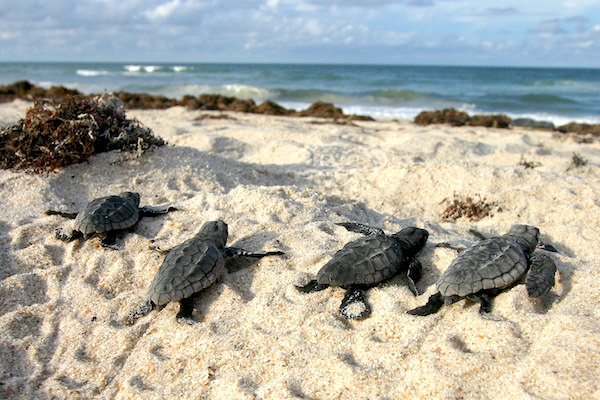SEBASTIAN – It’s that time again, and beachgoers should remember that if they encounter sea turtle hatchlings emerging from nests on the beaches in Sebastian, Wabasso, Vero Beach or elsewhere, to leave them alone.
From now through the end of October, sea turtle hatchlings are breaking out of their eggs on the shores of Sebastian and Vero Beach, digging out of nests and making their way across beaches to begin their lives in the Atlantic Ocean.
They usually emerge from their nests at night.
“Sea turtle hatchlings are small and appear helpless, so people may make the mistake of thinking they need assistance getting to the water. But you can help hatchlings home by leaving them alone,” said Robbin Trindell, who heads the Florida Fish and Wildlife Conservation Commission (FWC) sea turtle management program.
“Sea turtle hatchlings are biologically programmed to look for the brightest horizon and walk toward the water,” said Trindell. “Any interference or disturbance by people, such as getting too close or taking flash photos, increases the chances the hatchlings will get confused, go in the wrong direction and not reach the ocean quickly. That makes them vulnerable to dehydration, exhaustion, and predators. Remember, you need a special permit from the FWC to interact with sea turtle hatchlings. Beachgoers should never handle or interact with hatchlings on their own.”
Important things that people can do to help sea turtle hatchlings survive:
- Do not try to help hatchlings crawling toward the water. Young sea turtles need to continue their migration to the sea without assistance.
- Leave hatchlings undisturbed and watch them from a distance. Remember, it is illegal to pick up a hatchling, enter a posted nesting area or dig into a nest.
- Remove chairs, canopies and boats and other obstacles from the beach at night, and fill up holes in the sand so hatchlings can make their way unobstructed to the water.
- Refrain from taking flash photos of hatchlings, whether with a cellphone or camera. Do not shine flashlights on hatchlings or their nests.
- Minimize artificial lighting on the beach at night, or at least keep lights shielded. Bright lights on buildings or parking lots along the beach are harmful to hatchlings. The hatchlings head for the bright lights, thinking they are the sparkling sea, and end up walking landward where they may become prey for raccoons, coyotes and other animals or get run over on roads.
- Report any hatchlings that are stranded, wandering in a road or parking lot, heading away from the water or dead to the FWC’s 24-hour Wildlife Alert Hotline, 888-404-FWCC (3922) or *FWC or #FWC on a cellphone.
You can help support conservation of sea turtles and their hatchlings by purchasing a new sea turtle decal with a $5 donation.

